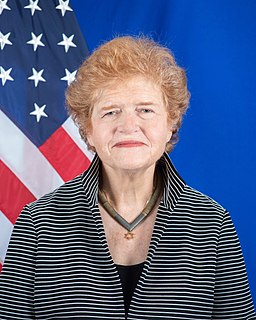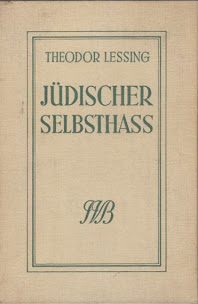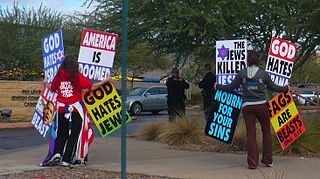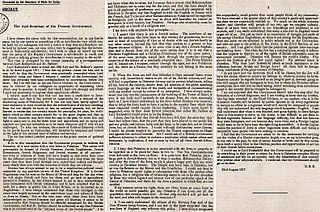Antisemitism is hostility to, prejudice towards, or discrimination against Jews. A person who holds such positions is called an antisemite. Antisemitism is considered to be a form of racism.

Holocaust denial is a form of genocide denial drawing on antisemitic conspiracy theories that asserts that the Nazi genocide of Jews, known as the Holocaust, is a myth, fabrication, or exaggeration. Holocaust deniers make one or more of the following false statements:

Deborah Esther Lipstadt is an American historian, best known as author of the books Denying the Holocaust (1993), History on Trial: My Day in Court with a Holocaust Denier (2005), The Eichmann Trial (2011), and Antisemitism: Here and Now (2019). She has served as the United States Special Envoy for Monitoring and Combating Anti-Semitism since May 3, 2022. Since 1993 she has been the Dorot Professor of Modern Jewish History and Holocaust Studies at Emory University in Atlanta, Georgia, United States.
New antisemitism is the idea that a new form of antisemitism has developed in the late 20th and early 21st centuries, tending to manifest itself as anti-Zionism and criticism of the Israeli government. The concept is included in some definitions of antisemitism, such as the Working Definition of Antisemitism and the 3D test of antisemitism.

Self-hating Jew or self-loathing Jew, both associated with auto-antisemitism, is a term which is used to describe Jews whose views are perceived as antisemitic. The concept gained widespread currency after Theodor Lessing's 1930 book Der jüdische Selbsthaß, which sought to explain a perceived inclination among Jewish intellectuals, toward inciting antisemitism, by stating their views about Judaism. The term is said to have become "something of a key term of opprobrium in and beyond Cold War-era debates about Zionism".

Racial antisemitism is prejudice against Jews based on a belief or assertion that Jews constitute a distinct race that has inherent traits or characteristics that appear in some way abhorrent or inherently inferior or otherwise different from the traits or characteristics of the rest of a society. The abhorrence may find expression in the form of discrimination, stereotypes or caricatures. Racial antisemitism may present Jews, as a group, as a threat in some way to the values or safety of a society. Racial antisemitism can seem deeper-rooted than religious antisemitism, because for religious antisemites conversion of Jews remains an option and once converted the "Jew" is gone. In the context of racial antisemitism Jews cannot get rid of their Jewishness.
Antisemitic canards are "sensational reports, misrepresentations, or fabrications" that are defamatory towards Judaism as a religion or defamatory towards Jews as an ethnic or religious group. Since the Middle Ages, they have formed parts of broader antisemitic conspiracy theories.
Kenneth S. Stern is an American attorney and an author. He is director of the Bard Center for the Study of Hate, a program of the Human Rights Project at Bard College. From 2014 to 2018 he was executive director of the Justus & Karin Rosenberg Foundation. From 1989 to 2014 he was director on antisemitism, hate studies and extremism for the American Jewish Committee. In 2000, Stern was a special advisor to the defense in the David Irving v. Penguin Books and Deborah Lipstadt trial. His 2020 book, The Conflict Over the Conflict: The Israel/Palestine Campus Debate, examines attempts of partisans of each side to censor the other, and the resulting damage to the academy.

The Holocaust had a deep effect on society both in Europe and the rest of the world, and today its consequences are still being felt, both by children and adults whose ancestors were victims of this genocide.
Antisemitism —prejudice, hatred of, or discrimination against Jews— has experienced a long history of expression since the days of ancient civilizations, with most of it having originated in the Christian and pre-Christian civilizations of Europe.

Antisemitism in the United States has existed for centuries. In the United States, most Jewish community relations agencies draw distinctions between antisemitism, which is measured in terms of attitudes and behaviors, and the security and status of American Jews, which are both measured by the occurrence of specific incidents. FBI data shows that in every year since 1991, Jews were the most frequent victims of religiously motivated hate crimes, according to a report which was published by the Anti-Defamation League in 2019. Evidence suggests that the true number of hate crimes against Jews is underreported, as is the case for many other targeted groups.

Anti-Zionism is the opposition to Zionism, also known as Jewish ethnonationalism.

The Office to Monitor and Combat Anti-Semitism is a part of the Office of Religion and Global Affairs (S/RGA) at the United States Department of State. The office "advocates U.S. policy on anti-Semitism both in the United States and internationally, develops and implements policies and projects to support efforts to combat anti-Semitism."
Antony Lerman is a British writer who specialises in the study of antisemitism, the Israeli–Palestinian conflict, multiculturalism, and the place of religion in society. From 2006 to early 2009, he was Director of the Institute for Jewish Policy Research, a think tank on issues affecting Jewish communities in Europe. From December 1999 to 2006, he was Chief Executive of the Hanadiv Charitable Foundation, renamed the Rothschild Foundation Europe in 2007. He is a founding member of the Jewish Forum for Justice and Human Rights, and a former editor of Patterns of Prejudice, a quarterly academic journal focusing on the sociology of race and ethnicity.
The Canadian Institute for the Study of Antisemitism (CISA) is one of seven institutes in the world dedicated to the scholarly study of antisemitism. Founded in 2010 by Canadian historian Catherine Chatterley, the Institute is a national organization based in Winnipeg.
Antisemitism in France has become heightened since the late 20th century and into the 21st century. In the early 21st century, most Jews in France, like most Muslims in France, are of North African origin. France has the largest population of Jews in the diaspora after the United States—an estimated 500,000–600,000 persons. Paris has the highest population, followed by Marseilles, which has 70,000 Jews. Expressions of anti-semitism were seen to rise during the Six-Day War of 1967 and the French anti-Zionist campaign of the 1970s and 1980s. Following the electoral successes achieved by the extreme right-wing National Front and an increasing denial of the Holocaust among some persons in the 1990s, surveys showed an increase in stereotypical antisemitic beliefs among the general French population.

"Progressive" Jewish Thought and the New Anti-Semitism is a 2006 essay written by Alvin Hirsch Rosenfeld, director of Indiana University's Center for the Study of Contemporary Antisemitism and professor of English and Jewish Studies. It was published by the American Jewish Committee (AJC) with an introduction by AJC executive director David A. Harris. The essay claims that a "number of Jews, through their speaking and writing, are feeding a rise in virulent antisemitism by questioning whether Israel should even exist".
Trials of the Diaspora: A History of Anti-Semitism in England is a 2010 book by British academic Anthony Julius. It is a description of a strain within the history of England that is discriminatory against Jews. The book argues that anti-Zionism in England developed out of antisemitism in the United Kingdom and utilizes many of the same antisemitic tropes in its arguments.
Allegations of antisemitism in the Labour Party of the United Kingdom (UK) have been made since Jeremy Corbyn was elected as leader of the party in September 2015. After comments by Naz Shah in 2014 and Ken Livingstone in 2016 resulted in their suspension from membership pending investigation, Corbyn established the Chakrabarti Inquiry, which concluded that the party was not "overrun by anti-Semitism or other forms of racism", although there was an "occasionally toxic atmosphere" and "clear evidence of ignorant attitudes". The Home Affairs Select Committee of Parliament held an inquiry into antisemitism in the UK in the same year and found "no reliable, empirical evidence to support the notion that there is a higher prevalence of antisemitic attitudes within the Labour Party than any other political party", though the leadership's lack of action "risks lending force to allegations that elements of the Labour movement are institutionally antisemitic".
Antisemitism is a growing problem in 21st-century Germany.








